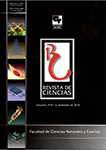Evaluation of Heavy Metal Content on a Sodic Soil Treated with Bio-waste
Palabras clave:
Vinasse, sewage sludge, soil remediation, composted swine manure, heavy metal content.Contenido principal del artículo
The use of bio-wastes in agriculture contributes to the conservation of natural resources by reciclyng carbon and mineral elements. This investigation evaluated the variation of the content of heaby metals in souls affected by sodicity, on which alternating doses of bio-wastes were applied: vinasse, composted swinte manure an sewage sludge forma a wastewater treatment plant. Ten treatments with three doses were implemented for each bio-waste treatment in addition to the control treatment. During the investigationm two applications of bio-wastes were performed with a temporal spacing of two months and three samples were taken: the first one corresponding to the initialcondition of the area without the application of bio-wastes, and the remaining two samples were taken on the first and seventeenth month respectively after the application of bio-wastes. The results indicated a low intake of heaby metals on the soil in the three evaluations that were carried out. However, the use of these residues in agriculture requires specific recommendations for each agro-climatic condition to preven environmental damage.
Downloads

Esta obra está bajo una licencia internacional Creative Commons Atribución-NoComercial-CompartirIgual 4.0.

